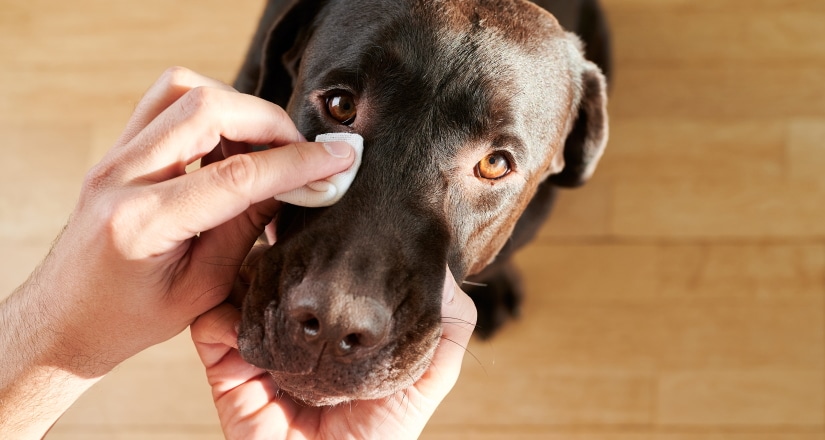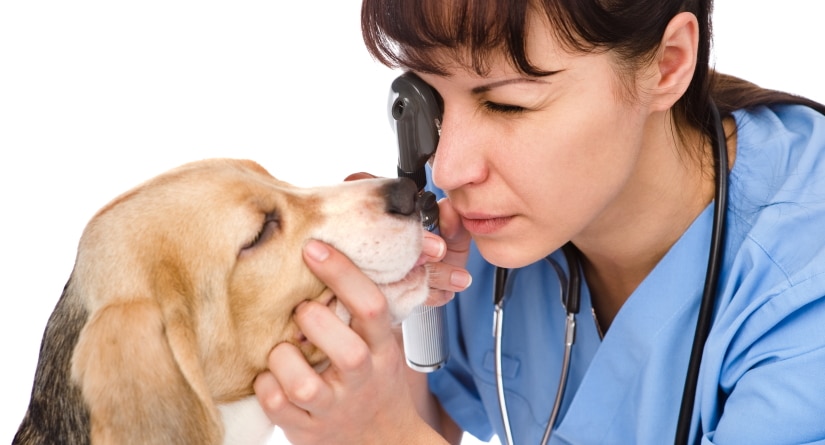A dog’s eyes function like human eyes, and dogs develop similar eye conditions to humans like cataracts, glaucoma, and other issues. Throughout your dog’s life, you’ll need to provide him with the best eye care and protect his sight.
Just like pet parents, a dog’s eyes can collect dirt. Unlike humans, a dog’s eyes are surrounded by hair that can interfere with keeping eyes healthy. Some dog breeds are also prone to getting certain eye diseases, so be sure to research any conditions that your pup may be inclined to, so that you’ll always be one step ahead. Most importantly, never ignore the signs of an eye injury or infection – visit your vet immediately.
The eye is an active organ that continually adjusts to the amount of light it lets in. The eye also focuses on objects close by and far away, producing images relayed to the brain. Because of the importance of sight to all animals, it’s essential to have your dog’s eyes examined. Your vet will do this during your dog’s annual checkup and may add additional tests. In this blog, we’re going to discuss eight ways to keep your dog’s eyes healthy.
10 Ways to Care for Dog Eyes at Home

You can choose from these 10 plants and herbs to take care of your dog’s eyes in your own home. These remedies also work well for your eyes, so feel free to try them out before using them on your dog.
Always check with your veterinarian before using any herbal products on your dog. As usual, keep in mind that the best way of removing mucus buildup at the corner of the eye is with a damp towel and a gentle dab.
Numerous veterinary eyewashes can be purchased from your vet. Routine checkups are the best way to keep your dog’s eyes healthy and free of bacteria, infections, and any developing issues.
Here’s the take on herbal options. That said, always consult with your vet before using any of these remedies at home. Any eye infection in your pup can come from viruses or bacteria. These can lead to serious eye infections and even blindness. Visit your vet at the first signs of an eye infection.
- Calendula – Calendula is a perennial herbaceous plant in the daisy family and grows in southwestern Asia, western Europe, and the Mediterranean. Use calendula in tinctures, ointments, and washes as remedies for your dog’s eye infections.
- Chamomile Tea – You can dip a cotton ball in a cup of cool chamomile tea and gently press on closed dog eyes. Use this remedy to clean or soothe your dog’s eyes any time to keep them healthy.
- Eyebright Tea – Dip a cotton ball in a cup of cool eyebright tea and gently press on your dog’s closed eyes. You can use this remedy like chamomile tea to refresh your dog’s eyes.
- Goldenseal Tea – Cool goldenseal tea is another option to use the same way as chamomile and eyebright tea. All three teas are soothing and safe for your dog’s eyes.
- Grape Seed Extract – Grape seed extract, rich with antioxidants, benefits dog eyes because it’s non-toxic, anti-fungal, anti-bacterial, and contains vitamins C and E. You can use grape seed extract or oil for your dog’s eye infections—mix five drops of grape seed extract or oil in 1 cup of distilled water. Dip a cotton ball in the mixture and squeeze out most of the liquid. Gently wipe your dog’s eyes, ears, or skin with a damp cotton ball to clean her infection.
- Lemon – You can mix 1/8 teaspoon fresh lemon juice with three tablespoons distilled water and use 2 or 3 drops of this solution to remedy infected dog eyes. Do not use lemon juice for pink eyes because it can irritate your dog’s eyes.
- Licorice Root Powder – Your dog’s vision may benefit from a small amount of licorice root in her food or a capsule. You can add a pinch of licorice root powder into your dog’s morning or evening meal as needed. Check with your veterinarian before giving your dog licorice root powder, especially if your dog has a heart condition or is pregnant or nursing because of dangerous side effects. Licorice root powder should be used in moderation.
- Turmeric – Sprinkle turmeric powder in your dog’s food daily to help dog eyes with cataracts. Daily dosage for turmeric should not exceed 1/4 teaspoon for every 10 pounds of your dog’s weight and not exceed two teaspoons for dogs over 100 pounds. Now you have eight easy ways to treat your dog’s eyes at home to keep them clean and help soothe irritations.
- Marigold – is a healing herb and a vital source of zeaxanthin, a carotenoid important for eye health
- Eyebright – This yields nutrients and is healing and soothing when used as a herbal tincture.

Add about an ounce of the herb to a quart of boiling water. Let it sit for an hour or more. Use those drops as an eye rinse. It’s super gentle, so you can apply it as often as you want to.
Keeping your pup’s eyes healthy and free of infection means keeping hair out of the eyes. Hair can irritate a dog’s eyes and cause disease and possibly dry eyes. Always be super gentle when cleaning the eyes, and if your pup seems to be in pain when you’re cleaning his eyes, now is the time to visit your vet.
Pink Eye (Conjunctivitis) in Dogs
Dogs with pink eye or conjunctivitis will have ocular discharge, red-eye, as well as swelling of the conjunctiva, known as conjunctival edema. This causes mild discomfort and secondary itchiness in your pets.
Ocular dryness (keratoconjunctivitis sicca (KCS)) is thought to be often the cause of non-infectious agents like allergies, hypersensitivity to pet meds, or a foreign object, as well as chronic antigen stimulation. If your pup is stung by a bee, wasp, or suffers a spider bite, you’ll need to visit your vet.
Spiders and bee stings cause an immediate immune reaction that involves the eyelids of both eyes and the conjunctiva. You’ll need to keep in mind that tumors around the eye may also contribute to conjunctivitis. If your pup is suffering from infectious conjunctivitis, which is less common, it’s best to visit your vet immediately. This is because infectious conjunctivitis can be caused by the following:
- Fungal agents
- Bacteria
- Parasites
- Virus

Canine distemper can be life-threatening and may also cause conjunctivitis. Tick-related conjunctivitis like rickettsia also is known to cause redness, swelling, and even small hemorrhages that contain a mucopurulent discharge.
Keeping your dog’s eyes healthy is vital to good vision, so make sure to visit your vet as soon as an infection like conjunctivitis occurs in your dog. It’s important to treat eye conditions and make sure that your dogs are on your vet’s correct eye meds.
Another essential thing to keep in mind is that feeding your pups the best foods for optimal eye vision can also stave off dogs’ eye problems. Explore and feed broccoli, cold-water salmon, eggs, blueberries, carrots, kale, tomatoes, pumpkin, sweet potatoes. Include these in your dog’s diet to help keep eyes sharp and protect from eye problems.
Please share your comments about your dog’s eye problems below to help other dog owners take better care of their dog’s eye health.
